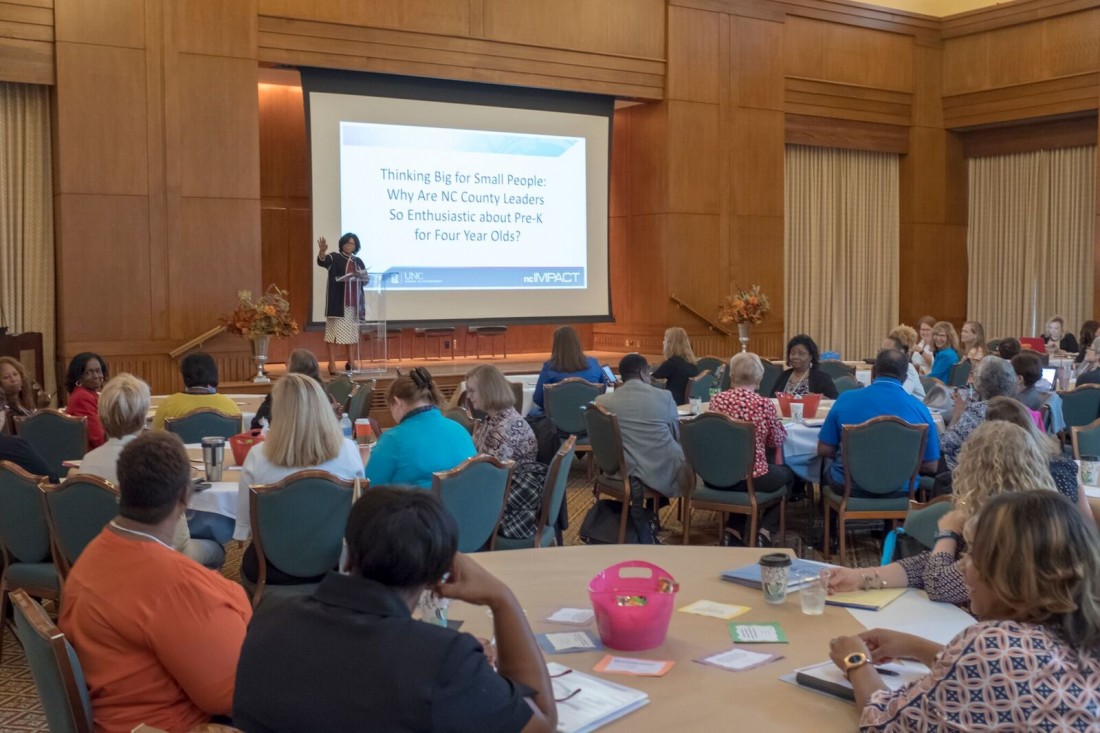Does Prekindergarten Push against the Curve of Community Change?
As with peers across the state and nation, these local leaders in North Carolina wanted to understand evidence about the opportunity for pre-K to change community metrics in grade-level reading, math and science scores, the social and emotional intelligence of youth, and workforce quality.

What happens when a room full of county commissioners, school board members, and early childhood practitioners spend the day diving deep into the data on preschool education with the state’s leading child development researchers? They start digging into how prekindergarten programs for four year olds push against the curve of community change.
On September 25, 2017, the Thinking Big for Small People group gathered in Chapel Hill for a day of training and reflection. The broader context for this gathering was the North Carolina General Assembly’s decision to increase funding for the state’s standard pre-K program delivered in each county, known as “NC Pre-K,” in its budget for the next two years. Program attendees spanned a continuum of familiarity with pre-K. Some came from communities with a great deal of curiosity, but no consensus about whether they would expand pre-K. Other communities had already set a goal for granting universal access to pre-K.
As with peers across the state and nation, these local leaders in North Carolina wanted to understand evidence about the opportunity for pre-K to change community metrics in grade-level reading, math and science scores, the social and emotional intelligence of youth, and workforce quality. They came understanding that big decisions about how to offer pre-K programming, and to whom, require careful decision-making. Read on for excerpts of the facts and data presented to them by childhood development researchers and other experts.
What did they hear about the opportunities?
“Convincing evidence shows that children attending a diverse array of state and school district pre-K programs are more ready for school at the end of their pre-K year than children who do not attend pre-K.”
“Studies of different groups of preschoolers often find greater improvement in learning at the end of the pre-k year for economically disadvantaged children and dual language learners than for more advantaged and English-proficient children.”
“Children who attended NC Pre-K performed significantly better on math skills at the end of kindergarten compared to a matched group of children who did not attend NC Pre-K.”
“Children who attended NC Pre-K performed better on a measure of executive function related to working memory compared to their peers who did not attend NC Pre-K. These results are important, because executive function is predictive of children’s later academic performance.”
What did they hear about the NC Pre-K program?
“Many of the characteristics of NC Pre-K are consistent with good quality standards, as well as with program guidelines.”
“State funding does not cover the full cost of NC Pre-K. Contractors report using the following types of funds to make up the difference: Smart Start, Head Start, Title I, Preschool and Early Childhood Funds, Child and Adult Care Food Program, and miscellaneous local funds.”
What did they hear about the challenges?
“In contrast to the findings for math skills, there were almost no differences in language and literacy skills, with the exception of one marginally significant finding for phonological awareness.”
“Pre-K for four year olds is no silver bullet. Progress requires true alignment of standards, curriculum, and instructional practices with an emphasis on process quality that is supportive of growth and development across multiple domains.”
“Data about who needs pre-K, where they live, and transportation needs are often challenges for programs.”
“Skilled teachers, adequate facilities, and partnership capacity are sometimes in short supply.”
What did they hear about the ways to move forward?
“Ask what needs strengthening if you plan to improve or expand your pre-k program.”
“Learn more about what is happening in your community. Go visit a pre-K classroom. Talk to an administrator. Talk to stakeholders. What do they need?”
“Determine what problem you’re trying to fix and what success would look like in your community.”
“Assess your strongest assets.”
Closing thoughts
ncIMPACT at the UNC School of Government was thrilled to deliver this program in partnership with the North Carolina Association of County Commissioners and the North Carolina School Boards Association, and with support from NC State’s Institute for Emerging Issues, the North Carolina Early Childhood Foundation, UNC-Chapel Hill’s Frank Porter Graham Child Development Institute, and Duke University’s Sanford School of Public Policy. Click here and select the “Materials” tab for the day’s agenda, speaker presentations, and other program materials.


